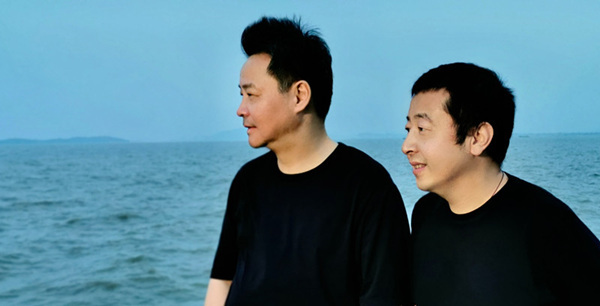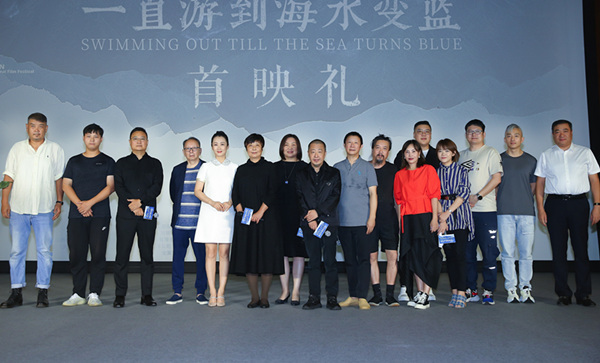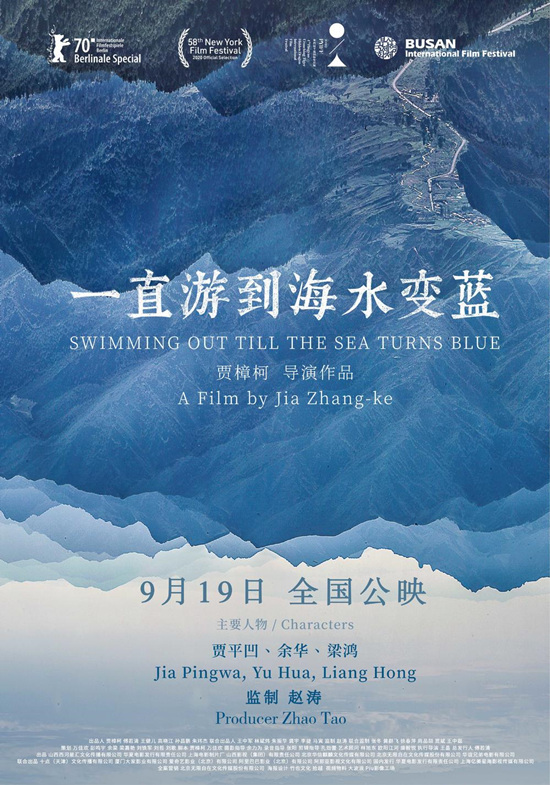Jia Zhangke documents acclaimed Chinese writers' rural pasts
- By Zhang Rui
 0 Comment(s)
0 Comment(s) Print
Print E-mail China.org.cn, September 16, 2021
E-mail China.org.cn, September 16, 2021
Last Monday, China's preeminent director Jia Zhangke was in Beijing for the premiere of his new documentary film, "Swimming Out Till The Sea Turns Blue," which features three highly acclaimed Chinese authors looking back at their lives and sharing personal stories intertwined with various periods in the country's history.

The premier was held at the National Museum of Modern Chinese Literature and attended by more than 100 writers, literary critics and scholars including award-winning writers Wang Meng, Liang Xiaosheng and Li Er.
"Swimming Out Till The Sea Turns Blue" is divided into 18 chapters, and primarily takes its narrative threads from three Chinese writers, Jia Pingwa, Yu Hua and Liang Hong, who were born in the 1950s, 1960s and 1970s, respectively. The three writers relate their own personal experiences, along with descriptions of the literary worlds they created to capture the monumental shifts in China's societal landscape throughout those defining decades. Likewise, Jia also includes snippets from several other writers as well as their descendants, to present a comprehensive yet delicate historical account of the spiritual history of the Chinese people.
"The film is not just about the countryside, nor just about the literature. The private memories of these writers are like an emotional index to each of us. We can follow their clue and finally swim into the emotional sea of each of us," Jia said.

Incidentally, the film was originally entitled "So Close to My Land," however, Jia was inspired to rename it after hearing a story from Yu Hua. "When I was young I often stood at the water's edge, seeing the sea was the color of yellow," Yu told him, "but in textbooks, it says the sea is blue. So at one point then, when I swam in the sea here, I wanted to swim and swim on, swimming out till the sea turns blue."
According to Jia, the words reflected these writers' life experiences of growing up in China's rural areas, only to migrate to urban cities where they achieved fame and fortune. "The film contains a changing force in China, a kindest desire for life by everyone, or a kind of tenacity – even encountering many difficulties, people still insist on moving forward," Jia explained.
The film also touches on elderly residents who are left behind in rural areas while young people move to the cities in search of a better life, reflecting significant changes to the lifestyles, traditions and communities of China's countryside.
"As the element that has the deepest impact on the spiritual structure of the Chinese people, the countryside provides a foothold and historical dimension for us to understand contemporary China," Jia said, noting writers are the best messengers, and many of them were once rural children. "They observed the countryside for a long time, and have been writing about the rural stories. Many urban problems are originated from the rural areas, we need to look back to the countryside."

Given the unprecedented rate of China's growth, Jia fears anything that doesn't get documented will be lost forever. "Oral history about people who have experienced in their life is important, we can use them as a document, a kind of witness, and a kind of testimony."
"Making this film is for resolving a mystery: what people in this country have experienced," he added.






Go to Forum >>0 Comment(s)